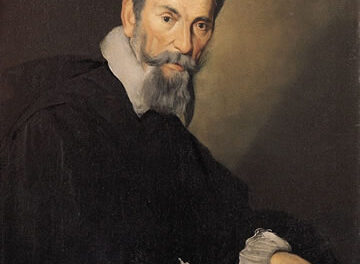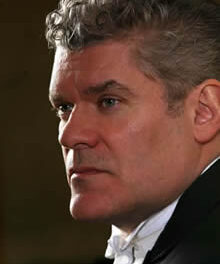Wow! What geniuses Verdi and Boïto were in adapting and telescoping Shakespeare’s Othello into a taut opera that hasn’t a single wasted note or moment! And wow! What a stirring, vital performance Otello was given by the Greensboro Opera Company, now in its twentieth year! Those were my immediate reactions as the curtain dropped on the tragic last scene in War Memorial Auditorium on November 2. It was an exciting evening of total theater rivaling recent GOC triumphs such as Puccini’s Tosca in 1999 and Verdi’s Falstaff in 1996.
All augured well with the great opening storm scene. The Greensboro Symphony under Valery Ryvkin, a member of the conducting staff of both the Metropolitan and San Francisco Operas, raged in the pit. The chorus staggered about the spare but suggestive dock as if responding to massive gusts of the hurricane. This was but one of the results of the effective staging of Artistic Director and Stage Director Bodo Igesz. Despite all the full characters’ duties, the chorus, prepared by David Holley, was always on the mark musically too. The lighting, designed by Norman Coates, was fully suggestive of a severe storm. The only glitches on opening night were some misfired lightning effects in Act I. The triumph came at the end of the storm scene when the dramatic arrival of Otello’s ship was realized on the stage. Tenor Allan Glassman strode majestically onto the dock and with a ringing ” Esultate ” was the Moor in the flesh. His body language often reminded me of Olivier’s portrayal of Othello in the classic film.
I waited in eager anticipation to see how the key role of Iago, sung baritone by Patryk Wroblewski, would transpire. Igesz had obviously taken to heart Verdi’s description of how to play the role: “His manner would be absent-minded, nonchalant, indifferent about everything, skeptical, bantering, and he would say both good and evil things lightly, as if he were thinking about something completely different from what he (was) saying.” Typical was Iago’s masterly and subtle manipulation of Cassio, sung by tenor Daniel Ebbers, and Rodrigo, sung by tenor Calland Metts, after the storm passed. Lighthearted on the surface, tension built as Iago egged Cassio into inebriation. Ryvkin created a chamber-music-like filigree that supported the stage action. Wroblewski’s firm voice was easily heard in the balcony. He is a singer to look forward to hearing again in the future.
Desdemona was well sung by soprano Krista Wozniak who has had several Triangle connections; she had sung as a member of the National Opera Company, which was based in Raleigh, and the Opera Company of North Carolina, and her solo orchestral debut took place at the North Carolina Symphony’s Viennese evening last year. Her opening duet with Otello went well, and her Willow song and Ave Maria, in the last act, were superb.
Since I was completely impressed with Glassman’s pleasing and solid tenor voice, I was surprised when Igesz announced from the stage between Acts II and III that the singer had been very ill for three days and sent his apologies to the audience but had “kindly consented” to complete the performance. If this is his standard on an off night, I cannot wait to hear him when he is fully on form! I had noticed only a slight dryness in his voice near the end of Act II, which made perfect dramatic sense in that context. He is definitely a singer to invite back!
All three lead singers were excellent. The Cassio, tenor Ebbers, had a somewhat tight voice but projected well. Mezzo-soprano Elvira Green, who has sung with both the Metropolitan and San Francisco Operas, was effective as Emilia, Desdemona’s maid. Bass Michael Douglas Jones was solid and august as Lodovico, the Venetian Ambassador. Two UNCG vocal students – bass Brett Pryor, as Otello’s predecessor Montano, and bass James J. Rollins, as the Herald – were excellent. I well remember Rollins as Jupiter in a wonderful UNCG performance of Offenbach’s Orpheus in the Underworld that took place last spring, prior to the birth of CVNC.












